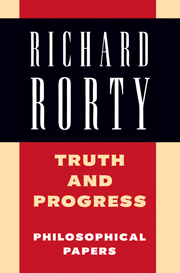Book contents
- Frontmatter
- Contents
- Introduction
- I Truth and Some Philosophers
- II Moral Progress: Toward More Inclusive Communities
- 9 Human Rights, Rationality, and Sentimentality
- 10 Rationality and Cultural Difference
- 11 Feminism and Pragmatism
- 12 The End of Leninism, Havel, and Social Hope
- III The Role of Philosophy in Human Progress
- Index
12 - The End of Leninism, Havel, and Social Hope
Published online by Cambridge University Press: 06 July 2010
- Frontmatter
- Contents
- Introduction
- I Truth and Some Philosophers
- II Moral Progress: Toward More Inclusive Communities
- 9 Human Rights, Rationality, and Sentimentality
- 10 Rationality and Cultural Difference
- 11 Feminism and Pragmatism
- 12 The End of Leninism, Havel, and Social Hope
- III The Role of Philosophy in Human Progress
- Index
Summary
At the beginning of his New Reflections on the Revolution of Our Time, Ernesto Laclau says: “The cycle of events which opened with the Russian Revolution has definitively closed… as a force of irradiation in the collective imaginary of the international left.… The corpse of Leninism, stripped of all the trappings of power, reveals its pathetic and deplorable reality.” I agree with Laclau, and I hope that intellectuals will use the death of Leninism as an occasion to rid themselves of the idea that they know, or ought to know, something about deep, underlying forces – forces that determine the fates of human communities.
We intellectuals have been making claims to such knowledge ever since we set up shop. Once we claimed to know thatjustice could not reign until kings became philosophers or philosophers kings; we claimed to know this on the basis of a searching inspection of the human soul. More recendy, we claimed to know diat it will not reign until capitalism is overthrown and culture decommodified; we claimed to know this on the basis of a grasp of the shape and movement of History. I would hope that we have reached a time at which we can finally get rid of the conviction common to Plato and Marx that there musthe large theoretical ways of finding out how to end injustice, as opposed to small experimental ways.
Laclau and Chantal Mouffe, in their much-discussed book, Hegemony and Socialist Strategy, suggest that the Left will have to setde for social democracy. Alan Ryan suggests that the best we can hope for is “a kind of welfarecapitalism-with-a-human-face, not easy to distinguish from a ‘socialism’ widi a big role for private capital and individual entrepreneurs.
- Type
- Chapter
- Information
- Truth and ProgressPhilosophical Papers, pp. 228 - 244Publisher: Cambridge University PressPrint publication year: 1998
- 2
- Cited by



